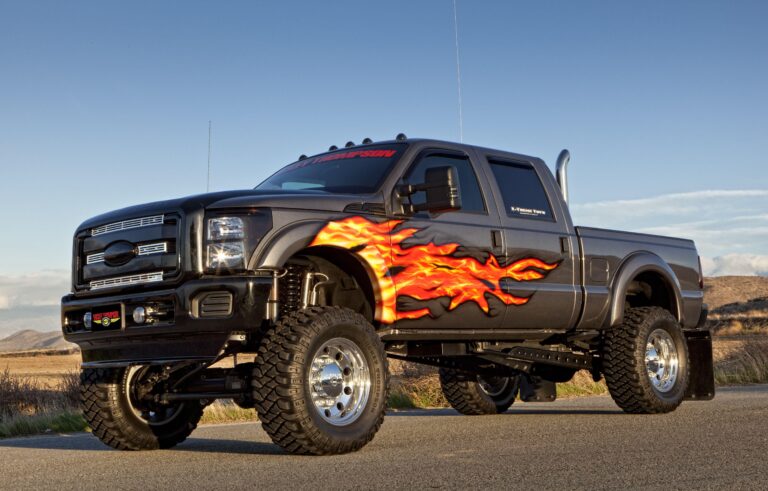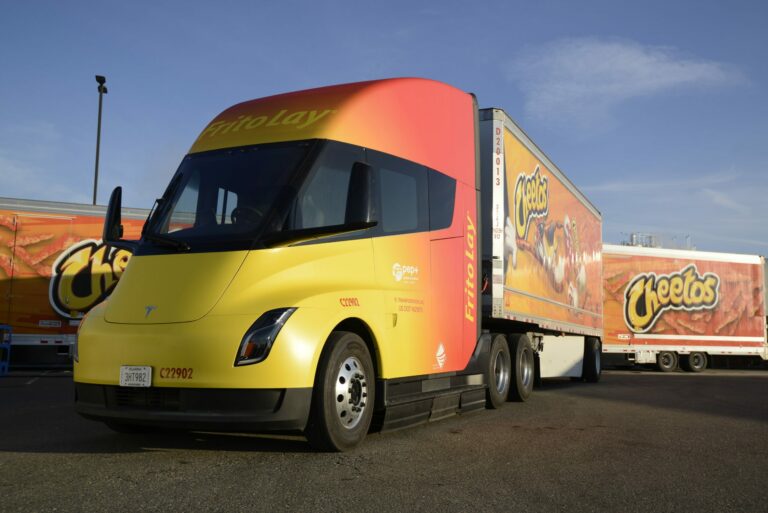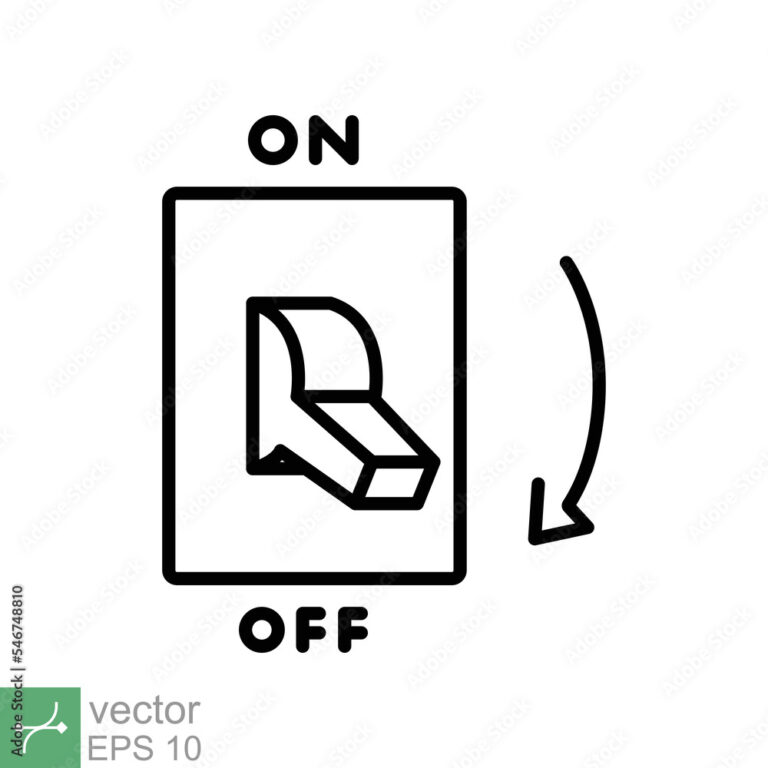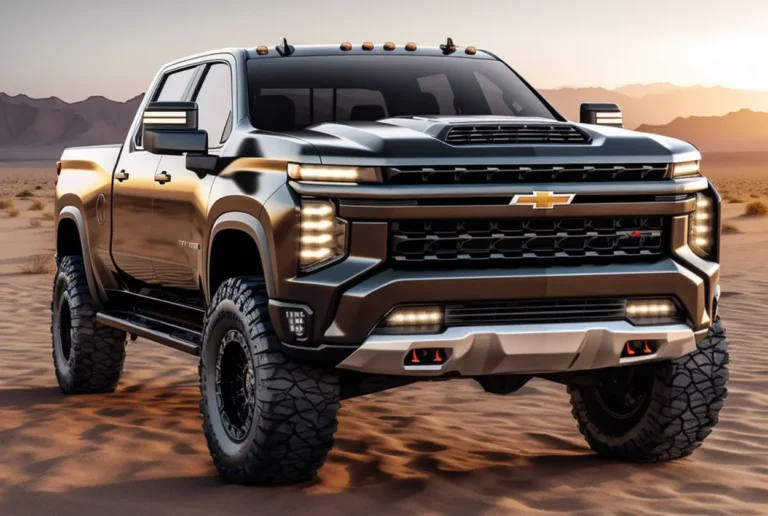Semi RV: The Ultimate Guide to Combining Power and Comfort
Semi RV: The Ultimate Guide to Combining Power and Comfort cars.truckstrend.com
Introduction
Imagine hitting the open road with the power of a commercial truck and the luxurious comforts of a high-end recreational vehicle. Welcome to the world of the Semi RV, a distinctive class of motorhome that marries the robust chassis and formidable engine of a semi-truck with custom-built living quarters. Far from your typical Class A or Class C RV, the Semi RV, often referred to as a "truck conversion" or "toterhome," represents the pinnacle of heavy-duty recreational travel. It’s a specialized niche for those who demand unparalleled towing capacity, exceptional durability, and an abundance of space and customization options. Whether you’re a full-time RVer, a motorsports enthusiast needing to haul heavy trailers, or simply someone who craves a truly unique and commanding presence on the highway, the Semi RV offers a compelling, albeit substantial, solution. This comprehensive guide will delve into every facet of these magnificent machines, exploring their benefits, challenges, types, and what you need to know to embark on your own powerful journey.
Semi RV: The Ultimate Guide to Combining Power and Comfort
What Exactly is a Semi RV?
At its core, a Semi RV is a recreational vehicle constructed on the chassis of a commercial semi-truck, typically a Class 8 heavy-duty truck from manufacturers like Volvo, Freightliner, Peterbilt, or Kenworth. Unlike traditional RVs built on lighter-duty truck or bus chassis, Semi RVs leverage the immense power, robust drivetrain, and long-haul engineering of a big rig.
There are generally two main categories within the Semi RV realm:
- Truck Conversions: These are often custom-built projects where a used semi-truck is transformed into a motorhome. The sleeper cab might be removed or integrated, and a new, often extensive, living module is built onto the frame. These can range from relatively simple DIY projects to highly elaborate, professionally crafted luxury homes on wheels.
- Toterhomes: While also built on semi-truck chassis, toterhomes are specifically designed with a focus on towing extremely heavy loads. They typically feature a comfortable living space forward of a large, heavy-duty hitch designed for fifth-wheel or gooseneck trailers. Toterhomes are popular among race teams, horse enthusiasts, and heavy equipment haulers who need both a powerful tow vehicle and comfortable on-site living quarters.
Both types offer a distinct blend of commercial-grade durability and residential-level comfort, setting them apart from any other RV class.
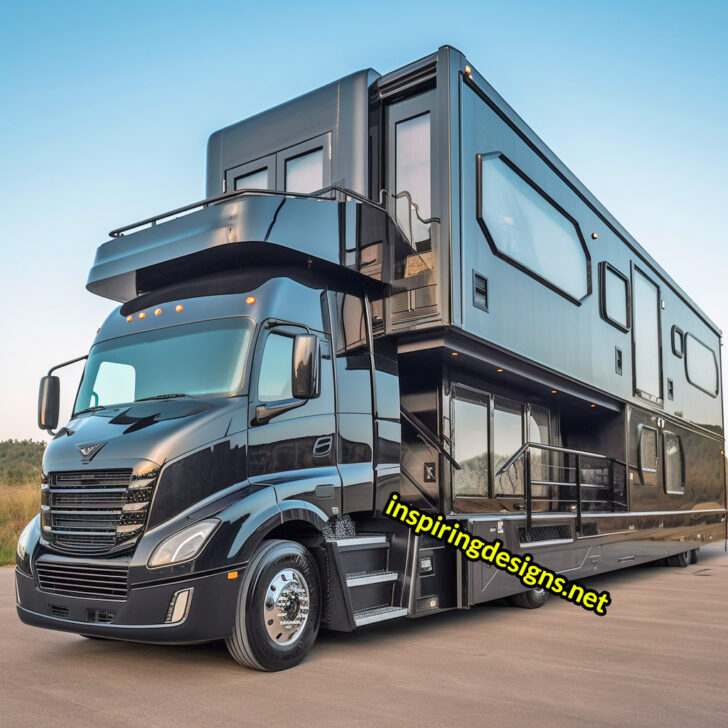
The Unrivaled Benefits of Owning a Semi RV
The decision to invest in a Semi RV is often driven by a unique set of advantages that simply aren’t available with conventional RVs:
- Unmatched Towing Capacity: This is perhaps the most significant benefit. Semi RVs can comfortably tow trailers weighing 30,000 lbs or more, making them ideal for large toy haulers, multi-car trailers, horse trailers, or even other RVs. Their powerful engines and heavy-duty drivetrains are engineered for continuous heavy hauling.
- Exceptional Durability and Longevity: Built for millions of miles of commercial use, the chassis, engine, and transmission of a semi-truck are designed for extreme reliability and longevity. This translates to an RV that can withstand extensive travel and provide decades of service, often outlasting several traditional RVs.
- Superior Space and Comfort: Semi RVs boast expansive living areas, often with higher ceilings, wider aisles, and more generous storage both inside and out. The cab itself is designed for long-haul comfort, offering spacious seating, excellent visibility, and often air-ride suspension for a remarkably smooth ride.
- Enhanced Safety: The sheer mass and robust construction of a semi-truck provide a significant safety advantage. In the event of a collision, a Semi RV offers superior protection. Furthermore, they feature commercial-grade air braking systems, providing unparalleled stopping power.
- High Customization Potential: For truck conversions, the large, robust chassis offers a blank canvas for customization. Owners can design layouts, choose materials, and integrate features that perfectly match their lifestyle, from dedicated workshops to gourmet kitchens.
- Greater Off-Grid Capability: Due to their size and robust nature, Semi RVs often have larger capacities for fresh water, grey water, black water, and fuel. They can also accommodate extensive solar power systems and large battery banks, enabling longer periods of boondocking.
- Commanding Road Presence: Driving a Semi RV offers an elevated view of the road, enhancing visibility and safety. Their imposing size also commands respect and attention, providing a unique driving experience.


Key Considerations Before Diving In
While the allure of a Semi RV is strong, prospective owners must be aware of several important considerations:
- Initial Cost and Depreciation: Purchasing a factory-built toterhome or commissioning a professional conversion can be a significant investment, often ranging from hundreds of thousands to over a million dollars. Even used conversions can command premium prices. While they depreciate slower than many traditional RVs, the initial outlay is substantial.
- Maneuverability and Size Restrictions: Semi RVs are large – very large. Their length, height, and weight can make navigating tight campgrounds, city streets, and even some gas stations challenging. Many state parks and older campgrounds have length limits that Semi RVs may exceed.
- Licensing Requirements: While most states do not require a Commercial Driver’s License (CDL) for a recreational vehicle (even a Semi RV) used for personal, non-commercial purposes, it is absolutely crucial to verify the specific laws in your state of residence and any states you plan to travel through. Some states may have specific weight thresholds or air brake endorsements.
- Maintenance and Repairs: Servicing a Semi RV requires specialized knowledge and equipment. Standard RV repair shops may not be equipped to handle heavy-duty truck components. Maintenance costs, including parts and labor, will generally be higher than for conventional RVs, though the intervals between major repairs might be longer.
- Fuel Economy: Big trucks mean big fuel consumption. Semi RVs typically achieve 6-10 miles per gallon (MPG), significantly less than many traditional RVs. This translates to higher fuel costs, especially on long trips.
- Parking and Storage: Finding suitable parking, whether overnight at a truck stop or long-term storage, can be more challenging and expensive due to the vehicle’s size.
- Insurance: Insuring a Semi RV can be more complex than insuring a standard RV. You may need specialized insurers who understand the unique nature of these vehicles.
Types of Semi RVs and Conversions
Understanding the different ways a Semi RV can come to be can help in your search:
- Factory-Built Toterhomes: These are purpose-built vehicles from manufacturers like Renegade RV, Showhauler, and NRC. They are designed from the ground up to be luxury motorhomes with substantial towing capabilities, often featuring high-end finishes and robust engineering.
- Custom Truck Conversions (Aftermarket): Many companies specialize in taking a used semi-truck chassis and performing a complete conversion into a motorhome. This allows for a high degree of customization based on client specifications.
- DIY Truck Conversions: For the mechanically inclined and budget-conscious, converting a used semi-truck yourself is an option. This requires significant skill, time, and resources but offers the ultimate in personalized design and can be a cost-effective route if done well.
- Class 8 Truck Chassis: Regardless of the conversion type, the base is almost always a Class 8 heavy-duty truck chassis. The choice of manufacturer (e.g., Freightliner Cascadia, Volvo VN, Peterbilt 389, Kenworth W900) often comes down to personal preference for cab design, engine type, and brand loyalty.
Practical Advice for Prospective Semi RV Owners
If you’re considering a Semi RV, here’s some actionable advice:
- Do Your Homework: Research extensively. Join online forums and social media groups dedicated to Semi RVs and truck conversions. Learn from experienced owners.
- Set a Realistic Budget: Beyond the purchase price, factor in conversion costs (if applicable), ongoing maintenance, higher fuel consumption, specialized insurance, and potential storage fees. Be prepared for a higher overall cost of ownership.
- Understand Licensing and Regulations: This cannot be stressed enough. Contact your state’s Department of Motor Vehicles (DMV) or equivalent agency to clarify specific licensing requirements for registering and operating a heavy-duty RV for personal use.
- Test Drive Extensively: Before committing, spend significant time behind the wheel. Get comfortable with the vehicle’s size, handling, and braking characteristics. Consider taking a heavy-duty driving course if available.
- Locate Specialized Mechanics: Identify reputable heavy-duty truck service centers in your area or along your planned travel routes. Building a relationship with a good mechanic is invaluable.
- Consider Pre-Owned Conversions: Purchasing a well-maintained, pre-owned professional conversion can offer significant savings compared to a new build, while still providing many of the benefits.
- Shop for Specialty Insurance: Standard auto or RV insurance companies may not cover Semi RVs. Seek out insurers who specialize in custom vehicles, commercial conversions, or large recreational vehicles.
- Plan Your Routes and Stays: Due to size limitations, not all campgrounds or roads will be accessible. Use resources like RV LIFE Trip Wizard or specific truck mapping apps to plan routes that accommodate your vehicle and identify suitable campsites or truck stops.
Potential Challenges and Solutions
While Semi RVs offer incredible advantages, they come with their own set of unique challenges. Here’s how to navigate them:
- Challenge: Limited Campground Access: Many national parks and older private campgrounds have length restrictions (often 30-40 feet).
- Solution: Prioritize larger, newer RV resorts or private parks. Utilize truck stops or rest areas for overnight stays when transit. Research camp sites thoroughly using apps or websites that indicate length limits.
- Challenge: Higher Maintenance Costs: Specialized parts and labor for heavy-duty trucks can be expensive.
- Solution: Adhere strictly to maintenance schedules to prevent major issues. Learn basic DIY maintenance tasks like oil changes and filter replacements. Build relationships with independent heavy-duty truck mechanics who may offer more competitive rates than dealerships.
- Challenge: Poor Fuel Economy: The sheer size and weight lead to lower MPG.
- Solution: Drive conservatively, avoid rapid acceleration, and maintain a consistent speed. Plan routes to minimize steep grades and stop-and-go traffic. Factor fuel costs heavily into your travel budget.
- Challenge: Steep Initial Investment: The cost of acquiring or converting a Semi RV is substantial.
- Solution: Explore financing options. Consider purchasing a well-maintained used chassis and undertaking a phased or DIY conversion to spread out costs. Focus on essential features first and upgrade later.
- Challenge: Finding Parking/Storage: Urban areas and even some suburban developments may lack suitable parking.
- Solution: Utilize truck stops for temporary parking. Research commercial storage facilities that can accommodate large vehicles. If you have private property, ensure it has adequate space and local zoning allows.
Semi RV Price Table
The cost of a Semi RV can vary dramatically based on whether it’s a factory-built unit, a professional custom conversion, or a DIY project, as well as the age and condition of the base chassis and the level of luxury.
| Category | Estimated Price Range (USD) | Notes |
|---|---|---|
| Used Semi Truck Chassis | $20,000 – $60,000+ | Price depends on age, mileage, condition, engine, and transmission. A good base for DIY. |
| Basic DIY Conversion Materials | $10,000 – $30,000+ | For materials only (insulation, plumbing, electrical, basic interior finishes). Labor is yours. |
| Professional Custom Conversion | $100,000 – $500,000+ | Cost to have a specialized company convert a customer-provided or purchased chassis. Highly variable. |
| Factory-Built Toterhome (New) | $200,000 – $1,000,000+ | From manufacturers like Renegade, Showhauler. Luxury models can exceed $1M. |
| Used Factory-Built Toterhome | $100,000 – $600,000+ | Offers significant savings. Price depends on age, mileage, condition, and original features. |
| Operating Costs (Annual Est.) | Varies widely, often $10,000+ | Includes fuel, routine maintenance, insurance, tires, and potential storage. Higher than traditional RVs. |
Note: These are general estimates. Prices can fluctuate based on market conditions, customization level, and specific features.
Frequently Asked Questions (FAQ)
Q1: Do I need a CDL to drive a Semi RV?
A: Generally, no. In most U.S. states, if the vehicle is registered as a recreational vehicle (RV) and used for personal, non-commercial purposes, a standard Class D (or equivalent) driver’s license is sufficient, regardless of weight. However, always verify the specific laws in your state of residence and any states you plan to travel through, as some may have specific endorsements for air brakes or vehicles over a certain weight.
Q2: Are Semi RVs difficult to drive?
A: They are significantly larger and heavier than typical vehicles, requiring more attention to clearance, turning radius, and braking distance. While modern semi-trucks are surprisingly comfortable and easy to operate, they do require practice and awareness. Drivers typically adapt quickly, especially with air-ride seats and suspensions that smooth out the ride.
Q3: Can I park a Semi RV at any campground?
A: No. Many campgrounds, especially state parks or older private parks, have length restrictions (e.g., 30-40 feet) that a Semi RV might exceed, especially if towing. It’s crucial to research and call ahead to confirm that a campground can accommodate your vehicle’s size. Truck stops and some larger RV resorts are typically more accommodating.
Q4: Is it expensive to maintain a Semi RV?
A: Yes, maintenance costs are generally higher than for traditional RVs. Parts for heavy-duty trucks can be more expensive, and specialized labor is required. However, these components are built for millions of miles, meaning they are incredibly durable and reliable, potentially leading to less frequent major repairs than lighter-duty vehicles.
Q5: What’s the fuel economy like for a Semi RV?
A: Semi RVs typically achieve between 6 to 10 miles per gallon (MPG), depending on factors like the engine, weight, terrain, and driving style. This is significantly less than most passenger vehicles and even many Class A RVs, so fuel costs will be a major ongoing expense.
Conclusion
The Semi RV is a testament to the pursuit of ultimate freedom and capability on the open road. It represents a unique blend of commercial-grade power and residential luxury, offering unparalleled towing capacity, robust durability, and expansive living spaces. While the journey to owning a Semi RV involves significant considerations regarding cost, size, and specialized maintenance, the rewards for those who embrace its unique characteristics are immense. For the full-time RVer, the serious hauler, or simply anyone seeking a motorhome that stands head and shoulders above the rest, the Semi RV offers a commanding presence and an unmatched level of comfort and reliability. It’s not just a vehicle; it’s a statement—a powerful home that’s built to conquer any highway, offering a truly distinctive and liberating travel experience for those ready to embrace the big rig lifestyle.

